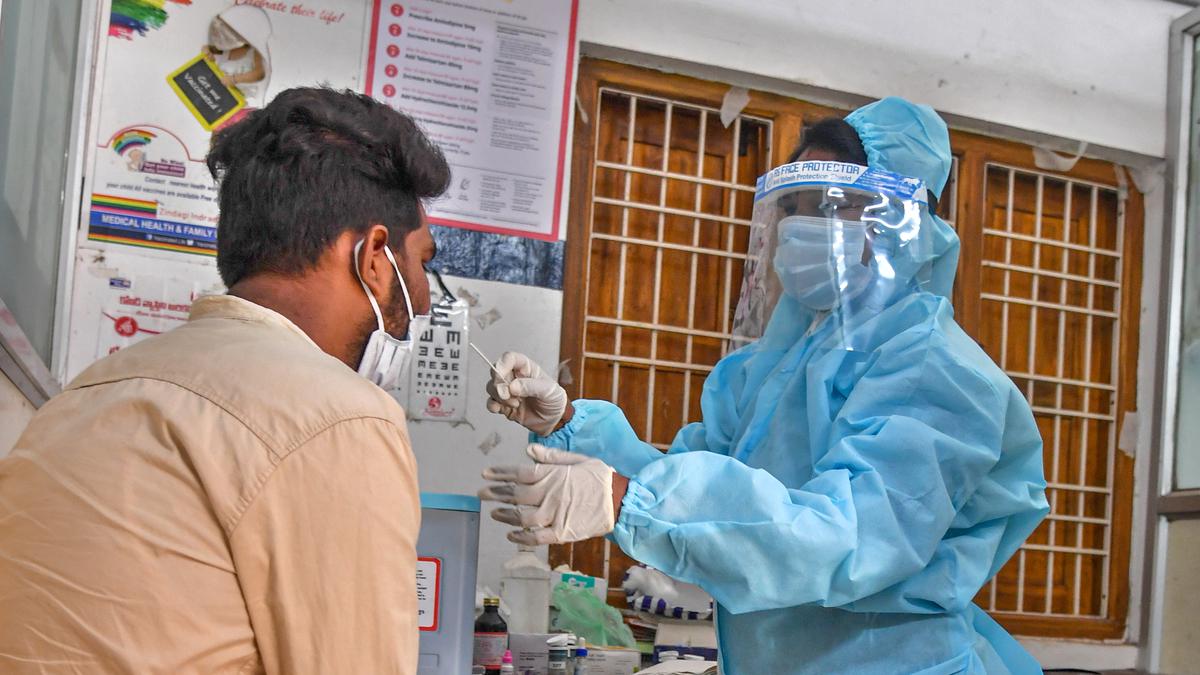
Visakhapatnam’s first co-morbid death of 2023 sparks fears of a year-end COVID-19 resurgence
The Hindu
.Visakhapatnam experiences 3 pandemic waves, with the emergence of a new JN.1 variant raising concerns of a resurgence. Mandatory masks, avoidance of public gatherings & regular handwashing are recommended.
Since the first COVID-19 case emerged in Allipuram area on March 19, 2020, the city has weathered multiple waves of the pandemic, with significant shifts being witnessed both in healthcare and lifestyle.
After a year-long hiatus, the emergence of a new ‘JN.1 variant’, marked by about 20 cases and the city’s first co-morbid COVID death on Tuesday, raises concerns about a potential year-end resurgence of the pandemic.
While the recent cases are not yet classified as the JN.1 variant, which has been declared a Variant of Interest by the World Health Organisation (WHO), uncertainty persists until the results of genome sequencing are received, according to King George Hospital Superintendent Dr. P. Ashok Kumar.
“We have sent all the samples for genome sequencing to the laboratory in Vijayawada and are expecting the results soon,” Dr. Ashok Kumar said.
Since March 2020, the city experienced three major pandemic waves. The first wave, which lasted from March 2020 to February 2021, peaked between July and September, causing widespread confusion and panic. Total and partial lockdowns, COVID-19 protocols, and containment zones were implemented, resulting in nearly 50,000 cases and around 500 deaths.
The second wave, fueled by the Delta variant, was the most brutal. It hit the city between April and June 2021, recording over 70,000 cases, with 50 to 60 per cent cases requiring hospitalisation and oxygen or ventilator support. Shortages of oxygen and drugs led to a significant rise in deaths, reaching approximately 550 cases.
The third wave, occurring from January 2022 to March 2022, was less severe, characterised by the XBB1.16 variant, a combination of Delta and Omicron. Although case numbers were high, hospitalisation rates and fatalities were low compared to the earlier two waves.

“Writing, in general, is a very solitary process,” says Yauvanika Chopra, Associate Director at The New India Foundation (NIF), which, earlier this year, announced the 12th edition of its NIF Book Fellowships for research and scholarship about Indian history after Independence. While authors, in general, are built for it, it can still get very lonely, says Chopra, pointing out that the fellowship’s community support is as valuable as the monetary benefits it offers. “There is a solid community of NIF fellows, trustees, language experts, jury members, all of whom are incredibly competent,” she says. “They really help make authors feel supported from manuscript to publication, so you never feel like you’re struggling through isolation.”

Several principals of government and private schools in Delhi on Tuesday said the Directorate of Education (DoE) circular from a day earlier, directing schools to conduct classes in ‘hybrid’ mode, had caused confusion regarding day-to-day operations as they did not know how many students would return to school from Wednesday and how would teachers instruct in two modes — online and in person — at once. The DoE circular on Monday had also stated that the option to “exercise online mode of education, wherever available, shall vest with the students and their guardians”. Several schoolteachers also expressed confusion regarding the DoE order. A government schoolteacher said he was unsure of how to cope with the resumption of physical classes, given that the order directing government offices to ensure that 50% of the employees work from home is still in place. On Monday, the Commission for Air Quality Management in the National Capital Region and Adjoining Areas (CAQM) had, on the orders of the Supreme Court, directed schools in Delhi-NCR to shift classes to the hybrid mode, following which the DoE had issued the circular. The court had urged the Centre’s pollution watchdog to consider restarting physical classes due to many students missing out on the mid-day meals and lacking the necessary means to attend classes online. The CAQM had, on November 20, asked schools in Delhi-NCR to shift to the online mode of teaching.









